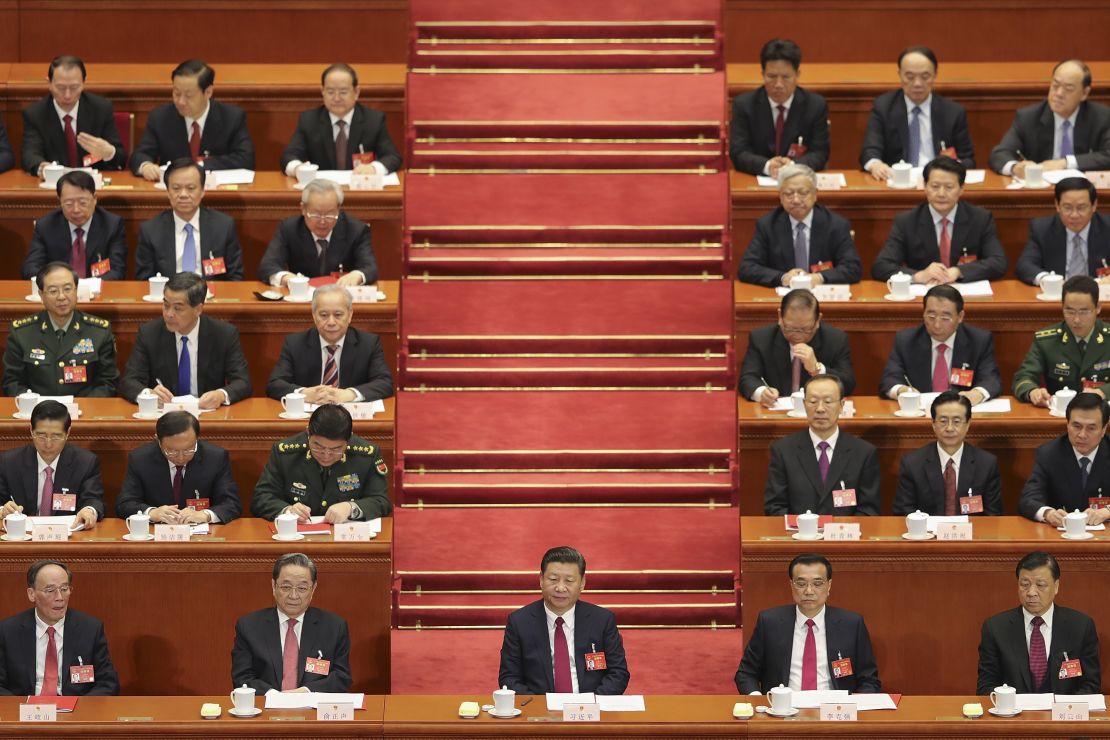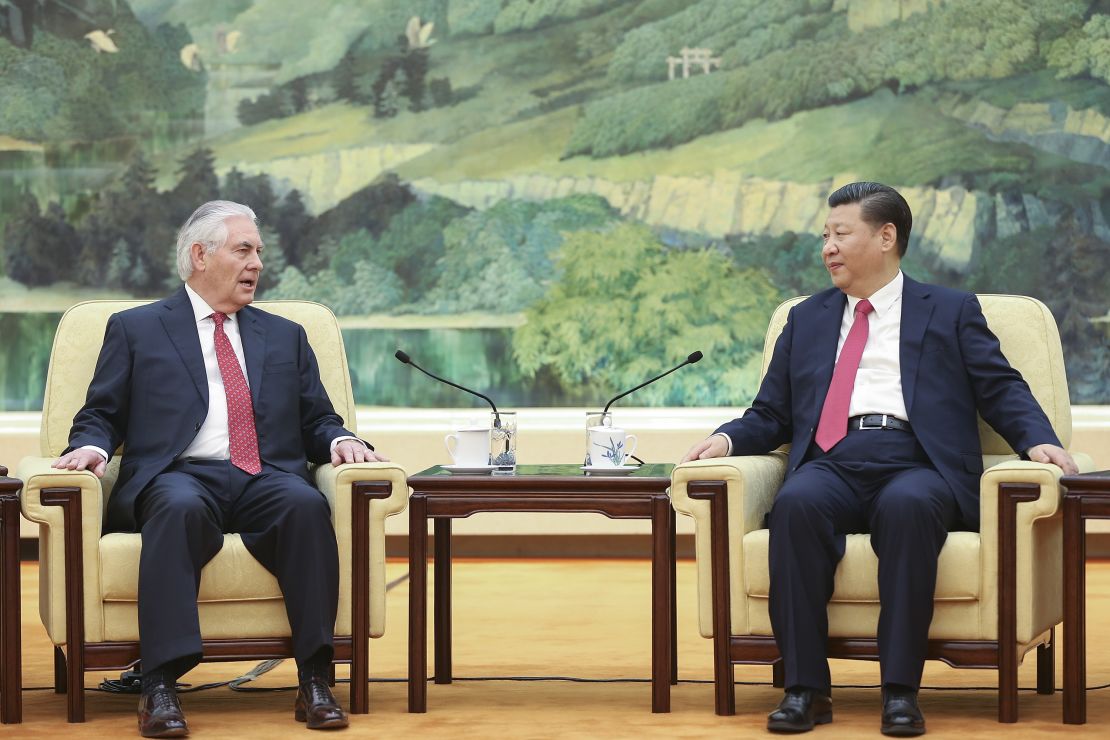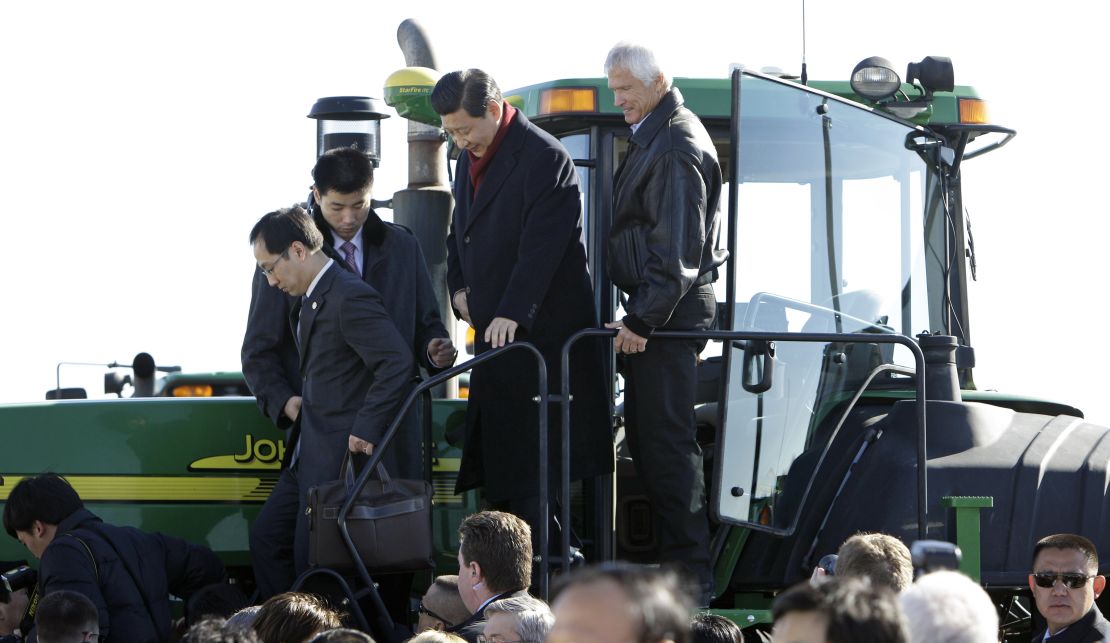Story highlights
President Xi Jinping is China's most powerful leader in 20 years, analysts say
Despite a bold foreign policy, experts question his ability to push through domestic reform
After less than five years as China’s leader, Xi Jinping has become one of the most powerful people in the nation’s modern history, outshining his immediate predecessors.
“He is a powerful figure, he is the most powerful leader since (paramount leader) Deng Xiaoping, but again his power has limitations,” Cheng Li, director at the Brookings Institution’s John L. Thornton China Center, told CNN.“China is not in the mood for a dictator-like figure.”
Arelative enigma when he came into power, in this first term Xi has revealed himself as not only an economic and political conservative but also a skilled populist.
His wide-reaching anti-corruption campaign, which has been criticized as a way to consolidate power, has been widely popular among ordinary Chinese.

Now, after being declared the country’s “core leader” in late 2016, Xi may be preparing to break two decades of tradition and stay on after his second term as head of the ruling Communist Party ends in 2022, some analysts say.
Still, as China steps up to the global stage in the wake of US President Donald Trump’s election, experts are divided on whether Xi can steer his country through the difficult times ahead.
Son of a revolutionary
Xi was born in June 1953, just four years after the People’s Republic of China was established by Chairman Mao Zedong.
He is one of China’s “princelings,” the sons and daughters of former revolutionary leaders who have risen into high positions within the party.
His father was Xi Zhongxun, a revolutionary fighter and former Chinese vice premier, who also pioneered China’s early experiments with capitalism, helping to establish Shenzhen’s Special Economic Zone.
As with many Chinese leaders, little is known about Xi’s early years until his father and family fell out of favor during the chaotic upheaval of the Cultural Revolution.

From 1969 to 1975, Xi worked as an agricultural laborer in Liangjiahe, Shaanxi province, one of 30 million urban youths who were sent to the countryside to teach them a lesson.
Xi’s time in Liangjiahe has become a powerful part of his personal narrative. Chinese tourists can even go to the city and see a small museum built to commemorate his time working among the people.
Eventually Xi’s father was rehabilitated after Mao’s death, and his son officially joined first the Communist Party in 1974, then became an official in the Chinese government.
Rise to power
Xi’s first official job in the Chinese government was personal secretary to the then-Minister of Defense Geng Biao.
A trip as part of a Chinese delegation to inspect US farming technology in Iowa in 1985 left a strong impression on the young leader, and he would return to the area as China’s vice president about 27 years later.
Iowa governor Terry Branstad, who met Xi on his 1985 trip, was named as Trump’s pick for ambassador to China in December.
The young princeling rose quickly through the ranks, and in 2002 he was named the party secretary of Zhejiang province, on China’s eastern coast.
Willy Lam, an adjunct professor at the Chinese University of Hong Kong’s Center for China Studies, said Xi turned his five years in Zhejiang province into a major advantage, building a power base that sustains him to this day.
“He has promoted large numbers of his former colleagues, associates, from Zhejiang province … this so-called Zhejiang faction is a major component of the Xi Jinping faction,” Lam said.
“The Xi Jinping faction, this is a testimony to his success in self-aggrandizement. It is now the largest faction in the party.”

In 2007, Xi was anointed as a member of China’s nine-member Politburo Standing Committee, the country’s top decision-making body.
Just five years later, he was named the general secretary of the Chinese Communist Party in November 2012, and officially became China’s president four months later in March.
But Xi’s style as party leader would be very different from that of his immediate predecessors, former leaders Jiang Zemin and Hu Jintao, who followed collective decision making in the Deng model.
“Deng was a major victim of the Cultural Revolution, so the first thing he said after taking power was no more personality cults, no more hero worship,” Lam said. “But Xi Jinping is a closet Maoist, he’s a big admirer.”
Core leader
The differences in leadership began with Xi’s widely publicized anti-corruption campaign.
Proclaiming to take down officials at all levels of power, or “tigers and flies,” the campaign has charged huge numbers of Chinese officials, almost 300,000 in 2015 alone.
“I believe it lifted public confidence in the Communist Party, otherwise China would be in great trouble. In many ways (corruption) was the greatest challenge for the communist system since the end of the Cultural Revolution,” Li said.
But some have pointed out that the campaign’s high-ranking targets were rarely Xi’s supporters.
“This anti-corruption campaign is very selective,” Chinese leadership analyst Bo Zhiyue told CNN. “Some people say if you look at the names of people who have been brought down, you don’t see a lot of names of (Xi’s) princeling allies.”
Amid the anti-corruption campaign, a separate propaganda campaign praising and promoting Xi went into overdrive.
China’s televisions and internet were filled with poetry lauding the Chinese leader, viral videos about his policies and visits by Xi to media organizations countrywide.
According to a study by the University of Hong Kong’s China Media Project, in the first 18 months of Xi’s administration, he was mentioned in party mouthpiece People’s Daily twice as much as Hu had been.
In October 2016, Xi’s special statuswas made official when he was named the Communist Party’s “core,” a powerfully symbolic title. “(For) a Western leader that would be Emperor for Life,” Lam told CNN.
A throwback?
With his new title and wide power base, Xi may be planning to stay on as China’s leader after the end of his second term in 2022, some experts suggest, breaking a tradition followed by his two predecessors.
“There are a lot of rumors that he’ll stay beyond his second term, (but) I think Chinese politics are not really predictable,” Bo said. Even if “he wants to be like Putin in Russia, to stay beyond his second term, we don’t know if this can be realized.”
Li said Xi needed to accumulate power in order to push through difficult political and economic reforms, but despite his bold power plays, China’s president has left many economists frustrated.
Trump-Xi summit
Some feel he has failed to live up to his rhetoric, particularly after his initial statements in 2012 that changes “can brook no delay.”
“His economic reforms have been disappointing … He’s a preservationist. He wants the (Communist Party) to maintain a total dominance over the country’s political and, to some extent, economic resources,” Lam said.
“He is not a man of the 21st century, he seems to be a throwback to the Mao Zedong era.”
As China attempts to take a greater role on the world stage, amid continually slowing economic growth, some experts have questioned if the country will continue to grow under Xi’s leadership.
“In spite of his charisma, in spite of his Machiavellian skills in winning over enemies, he has these big problems that I think no one can solve,” Lam said.
“How to square the circle? How to preserve the Communist Party’s nearly all embracing powers and have China move forward as a modern state?”








